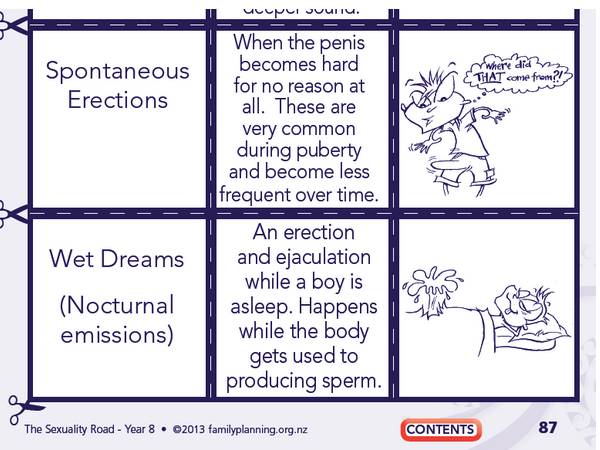Parent Applauded for Rejecting Sex Ed Programme
 Media Release 19 Nov 2015
Media Release 19 Nov 2015
Family First NZ says that a mother who withdrew her 9-year-old from a sex ed class run by Family Planning should be applauded, and that many more parents would take the same action if they were aware of what is being taught through programmes such as the Sexuality Road programme.
“We will be writing to all schools in NZ to warn them about the content and inappropriateness of this programme and other sex ed programmes being pushed at schools. Family Planning should butt out of schools and should allow and empower parents to educate their own children,” says Bob McCoskrie, National Director of Family First NZ.
“Most schools along with the parents in the school community will rightly reject the extreme elements of the new sexuality education guidelines just released, and resources should be targeted at parents to help them educate their own children. Primary school children as young as 5 will be indoctrinated with issues around ‘gender stereotypes and norms’ and ‘gender, sexuality and diversity’. But most children that age simply want to play, eat and have fun. We should let children be children.”
Issues covered in the Sexuality Road programme for year 8 intermediate students include:
True/False test on statements such as ‘Most women when they have their periods bleed for 14 days’, ‘A wet dream only happens if the boy doesn’t go to the toilet before bed’, ‘Vaginal discharges are normal’, ‘It’s normal for males / females to masturbate’, ‘Females can lose tampons in their body if they are not careful’, ‘Erections can occur at any time’, ‘The size of a guy’s penis shows how mature he is’.
Clarify that having no sexual contact is safest, but if sexually active, condoms provide the best protection.
Periods – pads and tampons, what do to with pads (mixed classes!)
Mix ‘N Match Card games with images that link to statements such as ‘Pubic hair grows around genitals’, ‘spontaneous erections’, ‘wet dreams’;
Dear Ms Q Questions: “The sexuality teacher told us that girls have a sexual organ called a ‘clitoris’. I’m curious to touch mine, but would that be naughty?”
Family Planning have previously suggested better sex education activities such as “Hot Bods”, which has students shading erogenous zones on a human outline and brainstorming elements of a positive sexual experience. At the Family Planning conference in 2013, one of the sessions was Health Promotion and Sexuality Education with the specific topic of “Let’s start at the beginning! Sexuality Education for Year 1-4 students.”
“This is effectively 5-8 year old children. Parents should be horrified at the prospect of groups like Family planning undermining the role and values of parents with resources which fail to take into account the emotional and physical development of each child and the values of the family,” says Mr McCoskrie.
Reports in 2011 revealed that children as young as 12 are being taught about oral sex and told it’s acceptable to play with a girl’s private parts as long as “she’s okay with it”. In other cases, 14-year-old girls are being taught how to put condoms on plastic penises, and one female teacher imitated the noises she made during orgasm to her class of 15-year-olds. A mixed class of boys and girls were asked by the AIDS Foundation if they had masturbated lately and were given condoms and strawberry-flavoured lubricant. They were also given a leaflet featuring graphic pictures, terms including “co*k” and “wa*k”, and advice on the best condoms.
“Parents know their children the best and should determine the best timing and most appropriate way to tackle topics such as keeping themselves safe and ‘where do babies come from.” A valueless ‘one size fits all’ approach is far too simplistic and can even be harmful,” says Mr McCoskrie.
“Studies show that the biggest protective factors for coping with puberty and sexual involvement are married parents, family values, parental supervision, and parental expectations for behavior. What happens at home is the greatest determinant of the outcomes for the young person.”
“Schools have become ‘one-stop shops’ for raising our children and dealing with every social issue. It’s time we empowered parents to fulfill this important role of preparing their own children. Parents can feel overawed by this issue and the need for ‘the sex talk’ so resources should be put into giving them the confidence to educate their children,” says Mr McCoskrie.
Family First released a report in 2013 “R18: Sexuality Education in New Zealand – A Critical Review” by US psychiatrist Dr Miriam Grossman which was sent to all school principals and all Board of Trustee Chairpersons of Intermediate and Secondary schools in NZ. Dr Grossman warned that the sex education resources fail to tell the full facts and compromise the concerns and wishes of parents, and the safety of young people.
“A premise of modern sex education is that young people have the right to make their own decisions about sexual activity, and no judging is allowed. Risky behaviours are normalised and even celebrated. Children and adolescents are introduced to sexual activities their parents would prefer they not even know about, let alone practice. It’s reasonable to ask: is the ‘comprehensive sexuality education’ foisted on young people all over the world about sexual health, or sexual licence?” says Dr Grossman.
“There seems to be a basic and ironic assumption that parents know nothing about sex and that only FPA and teachers do. This is a myth and should be rejected by both parents and politicians who fund these groups,” says Mr McCoskrie.
ENDS







